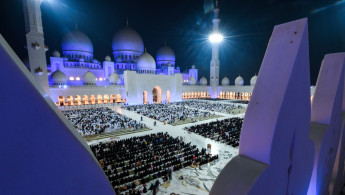'Forbidden': UAE declares congregational Ramadan prayers 'haram' amid coronavirus pandemic
The Emirates Fatwa Council said congregating for prayers despite social distancing measures put in place to curb the coronavirus would be haram, or forbidden, according to the religion.
Ramadan is traditionally a social time for Muslims where families gather to eat, socialise and pray together.
"Congregating to perform the prayer could endanger lives, an act that is strictly forbidden in Islam," said the statement.
The UAE has already closed down all houses of worship and banned congregational prayers as part of containment measures.
The religious body also said medical workers treating Covid-19 patients are exempt from fasting during Ramadan "if they fear that fasting could lead to weakening their immunity or to losing their patients".
The UAE has confirmed 6,781 positive cases of the novel coronavirus, including 41 deaths.
The move to suspend Ramadan prayers came just days after Saudi Arabia's Grand Mufti decreed all Muslims must pray nightly Ramadan Taraweeh and Eid prayers at home if the novel coronavirus disease persists.
"Ramadan's Taraweeh (evening) prayer can be performed at home if it cannot be performed at mosques due to the preventive measures taken to fight the spread of coronavirus," Sheikh Abdulaziz bin Abdullah bin Mohammed Al-Sheikh said.
Twitter Post
|
Al-Sheikh, the highest religious authority in Saudi Arabia, made this ruling speaking to Okaz, a newspaper aligned with the Saudi regime.
Taraweeh prayers are exclusively carried out in the holy month of Ramadan, where Muslims traditionally gather to pray in Mosques.
He said the same ruling will apply for Eid prayers, which take place the morning after the holy month of Ramadan is finished.
Leading Muslim clerics have backed the call to close all mosques during Ramadan, a time of year when they are usually at their busiest. Worshippers are already resorting to praying at home to contain the spread of coronavirus.
Read also: Will coronavirus cancel Ramadan? Five things to expect for this year's holy Muslim month
Saudi Arabia has also stopped issuing visas for all pilgrims wanting to perform the Umrah pilgrimage during Ramadan - a usual peak time which sees millions of visitors flock to the holy Mecca and Medina cities.
According to Saudi authorities, over 7 million foreign pilgrims travelled to the kingdom to visit Mecca during Ramadan in 2019.
Follow us on Facebook, Twitter and Instagram to stay connected





 Follow the Middle East's top stories in English at The New Arab on Google News
Follow the Middle East's top stories in English at The New Arab on Google News
![Netanyahu furiously denounced the ICC [Getty]](/sites/default/files/styles/image_330x185/public/2024-11/GettyImages-2169352575.jpg?h=199d8c1f&itok=-vRiruf5)
![Both Hamas and the Palestinian Authority welcomed the ICC arrest warrants [Getty]](/sites/default/files/styles/image_330x185/public/2024-11/GettyImages-2178351173.jpg?h=199d8c1f&itok=TV858iVg)
